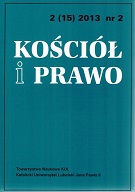Papieska Rada Tekstów Prawnych i interpretacje autentyczne
Pontifical Council for Legislative Texts and Authentic Interpretations
Author(s): Adam KaczorSubject(s): Law, Constitution, Jurisprudence
Published by: Towarzystwo Naukowe KUL & Katolicki Uniwersytet Lubelski Jana Pawła II
Keywords: Roman Curia; competences; legislation; interpretations of the law; recognitio
Summary/Abstract: The Author analyses the competences of the Pontifical Council for Legislative Texts, especially the most important one – the authentic interpretation. At the beginning the Author shows the historical background for the Council. The interpretation of canon law was not included in the legal system until the XX century. Pope Benedict XVI with motu proprio Cum iuris canonici, dated 15 September 1917, established the Pontifical Commission of Cardinals for Authentic Interpretation of the Code of Canon Law. Then, Pope John Paul II, with motu proprio Recognito Iuris Canonici, dated 2 January 1984, established the Pontifical Commission for Authentic Interpretation of the Code of Canon Law. Under the Apostolic constitution Pastor bonus (28 June 1988), John Paul II changed its name to the Pontifical Council for the Interpretation of the Legislative Texts. The functions of the Pontifical Council for Legislative Texts are presented in the article. Its main competence is the interpretation of the laws of the Church (art. 154-155 Pastor bonus). Moreover, the Council is competent to grant the general decrees of the conferences of bishops the recognitio (art. 157 Pastor bonus) and is at the service of the other Roman dicasteries (art. 156 Pastor bonus). The Author shows the methods of work of the Pontifical Council and cites examples of the authentic interpretations of the Council (Commission). At the end of the article it is concluded that the interpretation’s maxim of the canonical legal system is the “Spirit of the Vaticanum II”.
Journal: Kościół i Prawo
- Issue Year: 2/2013
- Issue No: 2 (15)
- Page Range: 133-163
- Page Count: 31
- Language: Polish

